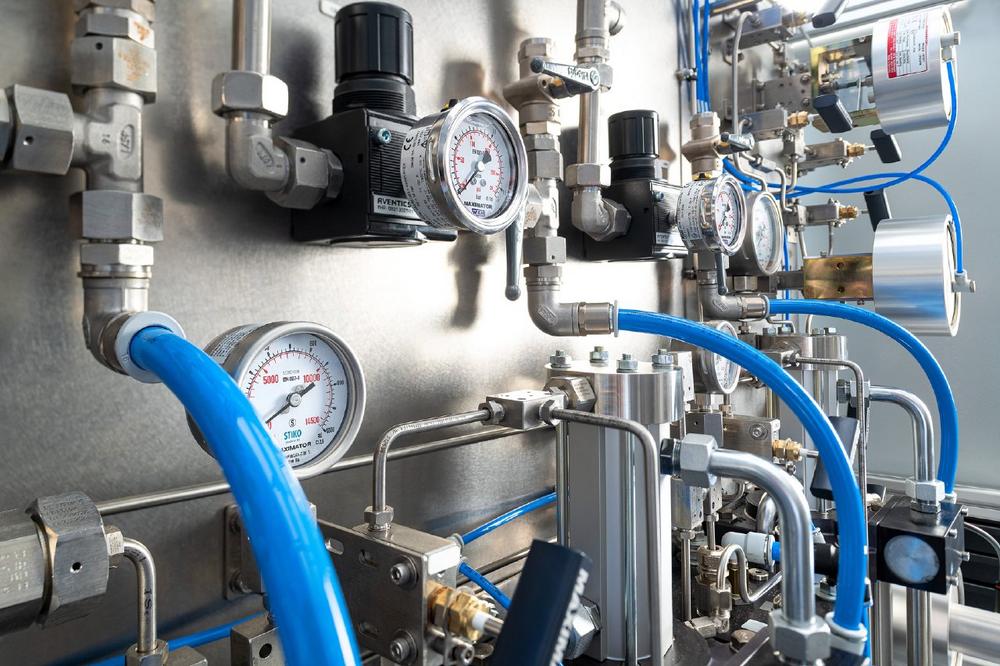With its H2 readiness qualification, TÜV SÜD checks the suitability of materials, components and complete systems for use in hydrogen atmospheres. One example of this is the P003 and P005 test standards developed in collaboration with manufacturers for the resistance of materials and the resistance and functionality of components in relation to hydrogen. In addition, specific certification guidelines from TÜV SÜD – for gas turbine and gas engine power plants, for example – provide a clear roadmap for manufacturers and operators to switch to hydrogen, thus laying the foundation for flexible use and operation.
Product liability and market access
Manufacturers of fuel cells, electrolysis plants and hydrogen-carrying components (e.g. for vehicles or filling stations) benefit from TÜV SÜD’s extensive experience in product liability and market access. The company’s experts show the right way to declare CE marking or obtain type approval. Taking into account relevant norms and standards – such as IEC 62282 (fuel cells), ISO 22734 (electrolysis systems), ISO 19880-X (refuelling station components), ISO 19887 (vehicle components) and ISO 17268 (refuelling couplings and nozzles) – they work with customers to ensure product-related qualification to cover product liability.
Safety under pressure: test procedures for the entire H2 range
TÜV SÜD’s test procedures cover the entire pressure and temperature range for hydrogen, helium and gas mixtures. The spectrum ranges from functional and service life tests to hydraulic burst tests and gas flow tests to leakage and permeation tests on pressure vessels. The hydrogen compatibility of metallic and non-metallic materials is also tested and appropriate product and system certificates are issued. This is supplemented by EMC tests specifically for hydrogen systems and environmental tests in accordance with LV 123/124 for components and pressure vessels.
Fuel your knowledge: further training on all aspects of hydrogen
TÜV SÜD’s role-based qualification scheme covers all requirements along the hydrogen value chain. It ranges from in-depth basic knowledge of hydrogen technology to specialised topics such as electrolysis processes, storage technologies, fuel cell applications and dealing with regulatory frameworks. These include, for example, material compatibility in connection with hydrogen, the preparation of declarations of conformity and the certification of green hydrogen. The focus is always on the safe and standard-compliant handling of hydrogen.
About hy-fcell
hy-fcell is one of the leading international trade fairs and conferences for hydrogen and fuel cell technology. On 7 and 8 October 2025, it will bring together experts from industry, research and politics at the Stuttgart Exhibition Centre. The focus will be on production technologies for fuel cells and electrolysis plants, hydrogen mobility, European market strategies and international networking. A conference programme with workshops and the presentation of the hy-fcell Awards will round off the event.
Further information on TÜV SÜD’s services in the field of hydrogen and fuel cell technologies, as well as on training and professional development opportunities, is available at:
Founded in 1866 as a steam boiler inspection association, the TÜV SÜD Group has evolved into a global enterprise. Around 30,000 employees work at over 1,000 locations in about 50 countries to continually improve technology, systems and expertise. They contribute significantly to making technical innovations such as Industry 4.0, autonomous driving and renewable energy safe and reliable. tuvsud.com
TÜV SÜD Customer Engagement and People GmbH
Westendstraße 199
80686 München
Telefon: +49 (89) 5791-0
Telefax: +49 (89) 5791-1551
http://www.tuvsud.com/de
Unternehmenskommunikation / Corporate Communications
Telefon: +49 (89) 5791-1592
Fax: +49 (89) 5791-2269
E-Mail: Dirk.Moser-Delarami@tuev-sued.de
![]()
